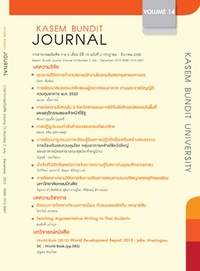การพัฒนาสมรรถนะหลักของผู้ตรวจสอบอาคาร ตามพระราชบัญญัติควบคุมอาคาร พ.ศ.2522
Keywords:
ผู้ตรวจสอบอาคาร, สมรรถนะหลักของผู้ตรวจสอบอาคาร, จรรยาบรรณในวิชาชีพผู้ตรวจสอบอาคาร, การพัฒนาในวิชาชีพผู้ตรวจสอบอาคาร, ประสบการณ์ในการตรวจสอบอาคาร, Building Inspectors, Core Competency of Building Inspectors, Professional Ethics, Professional DevelopmentAbstract
การวิจัยนี้ มีวัตถุประสงค์ ดังนี้ (1) เพื่อระบุสมรรถนะหลักของผู้ตรวจสอบอาคาร ที่กำหนดไว้ในพ.ร.บ.ควบคุมอาคาร พ.ศ. 2522 ของประเทศไทย (2) เพื่อประเมินสมรรถนะหลักในการตรวจสอบอาคาร ของผู้ตรวจสอบอาคารไทย ที่เป็นอยู่ในปัจจุบัน (3) เพื่อประมาณช่องว่าง (Gap) ระหว่างสมรรถนะหลักของผู้ตรวจสอบอาคารที่กำหนดไว้ในพ.ร.บ.ควบคุมอาคาร พ.ศ. 2522 ของประเทศไทย กับสมรรถนะหลักของผู้ตรวจสอบอาคารไทยที่เป็นอยู่ในปัจจุบัน (4) เพื่อวิเคราะห์ตัวแปรที่มีความสัมพันธ์เชิงเหตุ-ผลต่อสมรรถนะหลักในการตรวจสอบอาคารของผู้ตรวจสอบอาคารไทย (5) เพื่อเสนอแนะนโยบายในการพัฒนาสมรรถนะหลัก ในการตรวจสอบอาคารของผู้ตรวจสอบอาคารไทย
วิธีการวิจัย ใช้การวิจัยเชิงปริมาณ และการวิจัยเชิงคุณภาพ วิธีการวิจัยเชิงปริมาณ ใช้แบบสอบถามเป็นเครื่องมือในการรวบรวมข้อมูลจากผู้ตรวจสอบอาคารประเภทบุคคล ที่มีภูมิลำเนาในกรุงเทพมหานคร ประชากรในการศึกษาคือผู้ตรวจสอบอาคาร จำนวน 682 คน และมีกลุ่มตัวอย่าง 188 คน คิดเป็นร้อยละ 27.56 วิธีการวิจัยเชิงคุณภาพ เป็นส่วนเสริมข้อมูลให้สมบูรณ์ โดยการสัมภาษณ์เชิงลึก ผู้เชี่ยวชาญที่มีประสบการณ์ในการตรวจสอบอาคารอย่างน้อย 10 ปีขึ้นไป
ผลการศึกษาพบว่า ระดับสมรรถนะหลักของผู้ตรวจสอบอาคาร ด้านความรู้ในการตรวจสอบอาคารของผู้ตรวจสอบอาคารโดยภาพรวมอยู่ในเกณฑ์ต่ำ (ค่าเฉลี่ย = 14.15 หรือร้อยละ 47.17) ด้านทักษะในการตรวจสอบอาคารของผู้ตรวจสอบอาคารในภาพรวมอยู่ในเกณฑ์ปานกลาง ค่อนข้างต่ำ (ระดับ 93.81 คะแนน หรือร้อยละ 68.82) ด้านประสบการณ์ในการตรวจสอบอาคาร ในภาพรวมอยู่ในเกณฑ์ ค่อนข้างต่ำมาก (ค่าเฉลี่ย = 13.18 หรือร้อยละ 4.72 ) ด้านจรรยาบรรณในวิชาชีพผู้ตรวจสอบอาคาร ผู้ที่ขึ้นทะเบียนเป็นผู้ตรวจสอบอาคาร ให้ความสำคัญเกี่ยวกับจรรยาบรรณในวิชาชีพผู้ตรวจสอบอาคาร อยู่ในระดับสูง (ค่าเฉลี่ย = 46.06 คะแนน จาก 60 คะแนน หรือร้อยละ 76.77) ด้านการพัฒนาในวิชาชีพผู้ตรวจสอบอาคารมีการพัฒนาในวิชาชีพที่น้อยมากหรือแทบไม่ได้มีการพัฒนาวิชาชีพ (CPD) การอบรมการพัฒนาวิชาชีพการตรวจสอบอาคาร ไม่ได้มีการอบรมการพัฒนาวิชาชีพอย่างต่อเนื่อง หลังจากขึ้นทะเบียนเป็นผู้ตรวจสอบอาคาร จากการวิเคราะห์ตัวแบบความสัมพันธ์เชิงเหตุ-ผล (Causal model) ปรากฏว่าตัวแปรประสบการณ์ในการตรวจสอบอาคาร และตัวแปรการพัฒนาในวิชาชีพผู้ตรวจสอบอาคาร เป็นตัวแปรแทรกซ้อน(Intervening variables) ที่มีบทบาทน้อยต่อสมรรถนะหลักของผู้ตรวจสอบอาคาร แต่มีผลอย่างมีนัยสำคัญต่อจรรยาบรรณในวิชาชีพผู้ตรวจสอบอาคาร
ข้อเสนอแนะเชิงนโยบายการพัฒนาสมรรถนะของผู้ตรวจสอบอาคาร ควรเพิ่มความรู้การตรวจสอบอาคารให้ตรงหมวดการตรวจสอบอาคารที่ผู้ตรวจสอบอาคารที่ยังมีความรู้ต่ำคือด้านการตรวจสอบความมั่นคงแข็งแรงของอาคาร และระบบและอุปกรณ์ประกอบของอาคาร โดยจูงใจว่าเมื่อผ่านการอบรมสัมมนา และการพัฒนาวิชาชีพ CPD แล้ว มีผลในการพิจารณาเพื่อใช้ในการต่อใบอนุญาตผู้ตรวจสอบอาคาร ด้านทักษะในการตรวจสอบอาคารของผู้ตรวจสอบอาคาร ควรพัฒนาในหมวดการตรวจสอบระบบและอุปกรณ์ประกอบของอาคาร ได้แก่ ระบบบริการและอำนวยความสะดวก ประกอบด้วยการตรวจสอบระบบลิฟต์ ระบบบันไดเลื่อน ระบบสุขอนามัยและสิ่งแวดล้อม ระบบระบายน้ำฝน ระบบจัดการมูลฝอย ระบบระบายอากาศ และระบบควบคุมมลพิษทางอากาศและเสียง การต่อใบอนุญาต เป็นผู้ตรวจสอบอาคาร ต้องมีประสบการณ์การตรวจสอบอาคาร ด้านจรรยาบรรณในวิชาชีพผู้ตรวจสอบอาคาร ควรจัดทำรายงานพร้อมบันทึกผลงานการตรวจสอบอาคารประจำปีเสนอแต่ละสภาวิชาชีพ ตามรูปแบบที่กำหนดในจรรยาบรรณวิชาชีพให้สอดคล้องกัน เพื่อประกอบการเลื่อนอันดับประเภทการขึ้นทะเบียนรับอนุญาตใบประกอบวิชาชีพ ประเภทสามัญและวุฒิ ระบุหน่วยงานดูแลการสรรหาและเลือกตั้งจากผู้ตรวจสอบอาคาร เพื่อเป็นคณะอนุกรรมการ กำกับ ดูแล ตรวจสอบจรรยาบรรณ และกำหนดโทษผู้ตรวจสอบอาคาร ด้านการพัฒนาในวิชาชีพผู้ตรวจสอบอาคาร ควรจัดสัมมนาการเขียนรายงานการตรวจสอบอาคารให้ผู้ที่ขึ้นทะเบียนเป็นผู้ตรวจสอบอาคาร ให้การสนับสนุนการพัฒนาในวิชาชีพผู้ตรวจสอบอาคาร โดยมีการดำเนินการอย่างต่อเนื่อง และมีการออกใบประกาศนียบัตรเพื่อประกอบการต่อใบอนุญาตการเป็นผู้ตรวจสอบอาคาร และจัดเป็นกิจกรรมดำเนินการโดยเฉพาะเพื่อพัฒนาในวิชาชีพผู้ตรวจสอบอาคาร
Main objectives of the research were as follows : (1) To identify the required core competency of building inspectors according to Building Control Act 2522 of Thailand, (2) To evaluate the actual core competency of the building inspectors in Thailand, (3) To estimate the gap between the required and actual core competencies of building inspectors in Thailand, (4) To perform a causal relation analysis of variables affecting core competency of building inspectors in Thailand, (5) To suggest policies for enhancing knowledge and skills in the core competency of the building inspectors in Thailand.
The research methodology adopted the quantitative and qualitative approaches. The study population consisted of 682 building inspectors; 188 or 27.56 percent of them constituted an accidental sample for this study. In-depth interviews were conducted with experts who had at least 10 years of experience in work related to building inspection.
The results showed that knowledge in the building inspection of the inspectors was low (mean = 14.15, or 47.17 percent), while the skill of building inspection being above average but it was relatively low (mean = 93.81, or 68.82 percent). The averaged experience in building inspection was at a very low level (mean = 13.18, or 4.72 percent). Regarding the professional code of conduct, registered building inspectors exhibited the professional ethics of building inspection at a high level (mean = 46.06, or 76.77 percent). As far as Continuous Professional Development (CPD) was concerned, it was insufficient and not continuous. The analysis of the causal model whereby experience in building inspection, as well as the development of professional building inspectors, were intervening variables between personal characteristics on the one hand and core competency of the building inspectors and professional ethics on the other revealed that the intervening variables played little role on the core competency but affected significantly on professional ethics of the building inspectors.
For the development of knowledge and skills of building inspectors, the following policies are proposed. With regard to knowledge of building inspection, it is worthwhile to equip the building inspectors with additional knowledge on inspection of strength and security of the building and various systems and equipments in the building. To enhance skills in building inspection, in addition, the inspection skills of systems, equipment, services and facilities should be emphasized namely, elevator and escalator monitoring, sanitation and environmental, water drainage, solid waste management, ventilation, monitoring and control of air and noise pollution. Moreover experience to a certain level should be required of applicants before granting of a building inspection license. As for the ethics of professional building inspectors, it should be required that report and record of inspection of the building should be submitted to the Professional Federation of Building Inspectors after performing building inspection. This will be used for promotion of the building inspector to the rank of Senior and Professional Engineers. There is also the need to establish an organization for searching and appointment of building inspectors to be subcommittee members for overseeing and enforcement of Professional Codes of Conduct. Last but not least, building inspectors need continuous enhancement of their skills and knowledge of building inspection in order to keep up with changes in construction and building technologies. For this reason, they should be encouraged to attend seminars and workshops on building and construction technologies regularly, particularly not only for professional development but also as a requirement for the extension of their license to be a building inspector.
Downloads
How to Cite
Issue
Section
License
ทัศนคติ ความคิดเห็นใด ๆ ที่ปรากฏในวารสารเกษมบัณฑิตฉบับนี้เป็นของผู้เขียน โดยเฉพาะ มหาวิทยาลัยเกษมบัณฑิตและบรรณาธิการ ไม่จำเป็นต้องมีความเห็นพ้องด้วย







